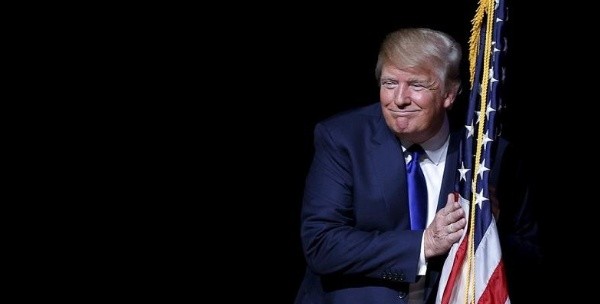PHOTO: Donald Trump hugs a US flag in New Hampshire, August 19, 2015 (Reuters)
I have spoken with a series of British TV and radio outlets since Presidential candidate Donald Trump’s statement on Monday that all Muslims should be barred entry into America.
See also US Analysis: “Trump’s Poison Will Longer Long After the Election”
Trying to put Trump’s tactics of hatred and division into a wider context, I have argued that the challenger for the Republican nomination is exploiting a US “culture of fear” that has built up since World War — from the fear of Communist takeover in the Cold War to the 1990s worries about race, crime, and drugs to the post-9/11 focus on the supposed danger of Arabs, people from the Middle East, and Muslims.
An interview with BBC Radio Scotland on Wednesday morning is posted — it will be followed by discussions with BBC Radio Wales and BBC WM.
BBC Scotland: Listen from 1:17.50
BBC Wales: Listen from 39:12
BBC WM: Listen from 52:22
Just like I’ve seen children who shout out loudly to get attention, Donald Trump does the same. He just happens to be an adult businessman and a person who’s trying to become President of the United States.
How many will fall for a rhetoric of division and hatred which gets us nowhere?
On Trump’s exploitation of a “culture of fear”:
There’s a paradox. This is the most powerful country in the world, yet it’s always been a fearful place. We used to fear the Communists in the Cold War, then in the 1990s we feared our cities would be rioting and there would be problems with drugs and crime. And then after 9-11 and the disaster of Iraq, we have had this ongoing corrosive notion of the “War on Terror” in which we treat a large part of our country — people who happen to be Islamic or from the Middle East or just look different — as people we have to fear, rather than people we consider to be part of our community.
And would I vote for Trump and his position on Muslims?
If I was dragged by 100 of his henchmen to the polls and my arms were forced up to the machine and they held my finger over the button, I still wouldn’t press it.
This isn’t just a question of not wanting to vote for someone. I consider him to be a damaging influence. He is damaging politically, he is damaging culturally, he is damaging to any possibility of decent relations between people.
And there is no way I am going to support hatred by endorsing that man.






